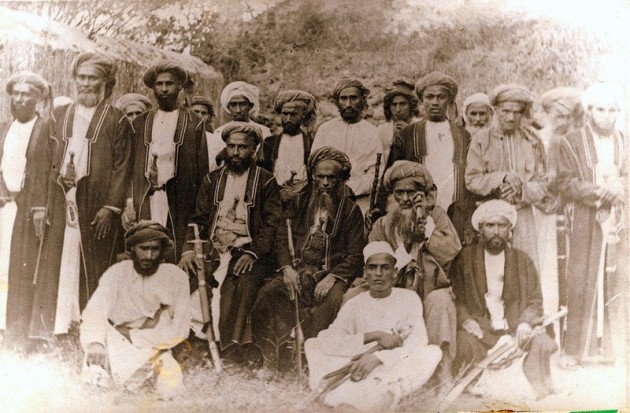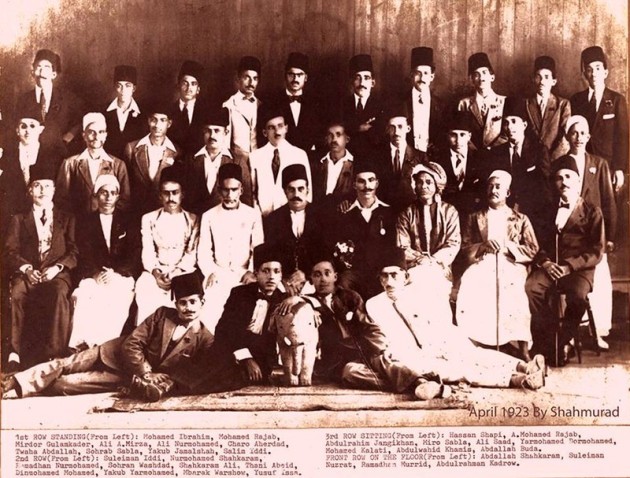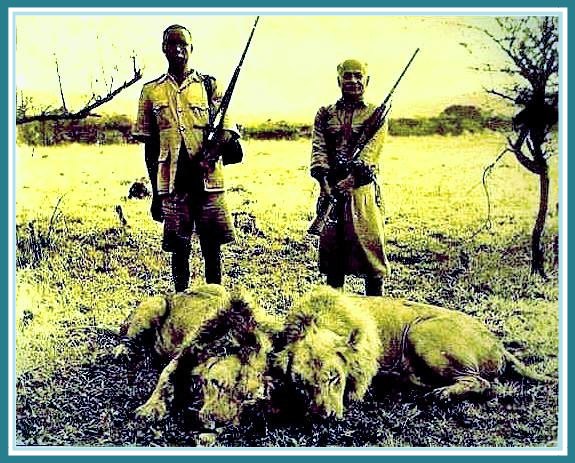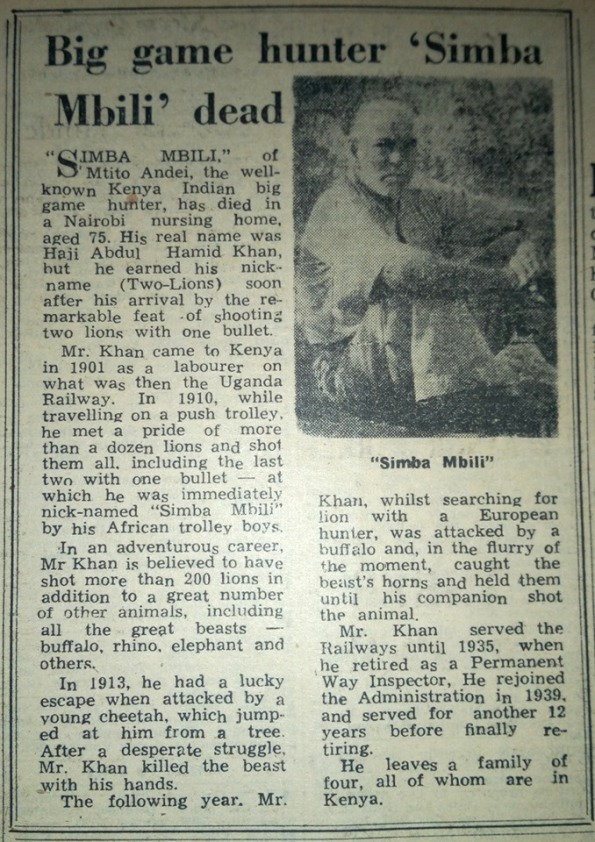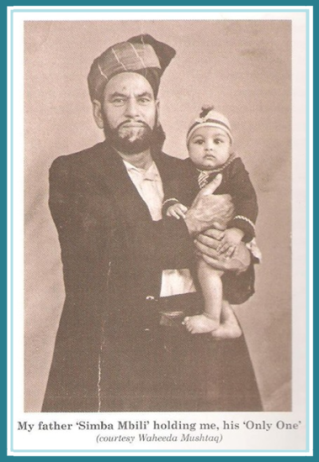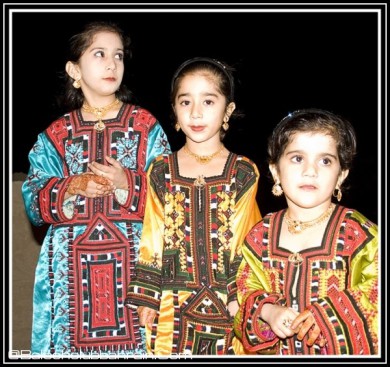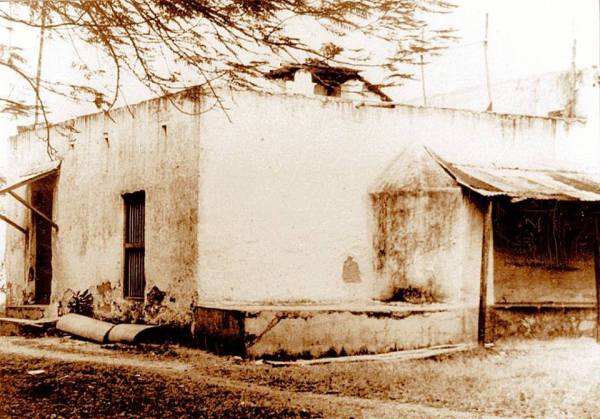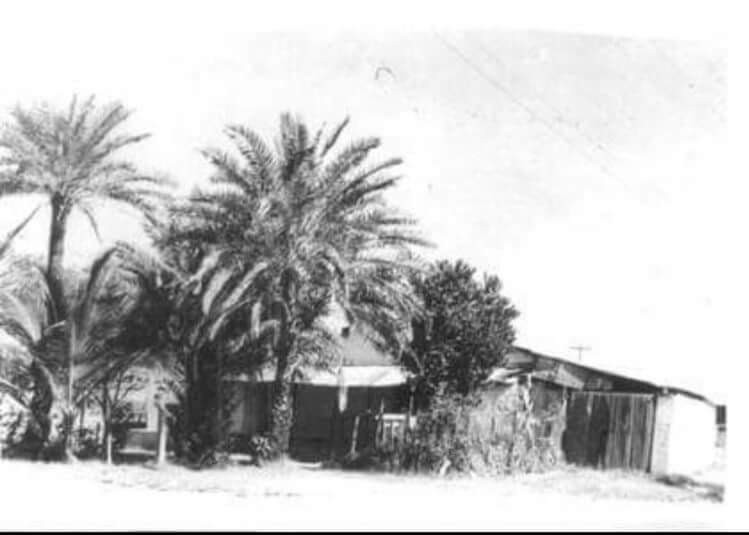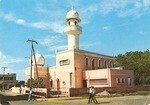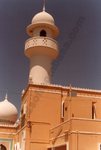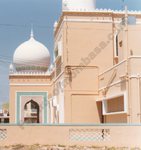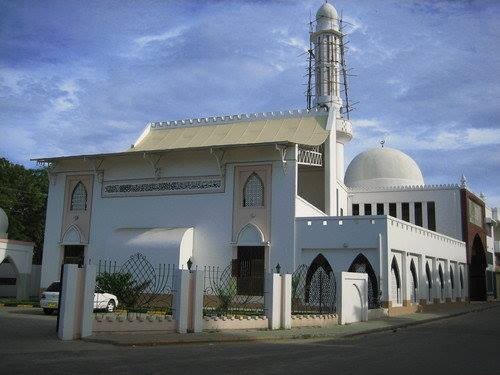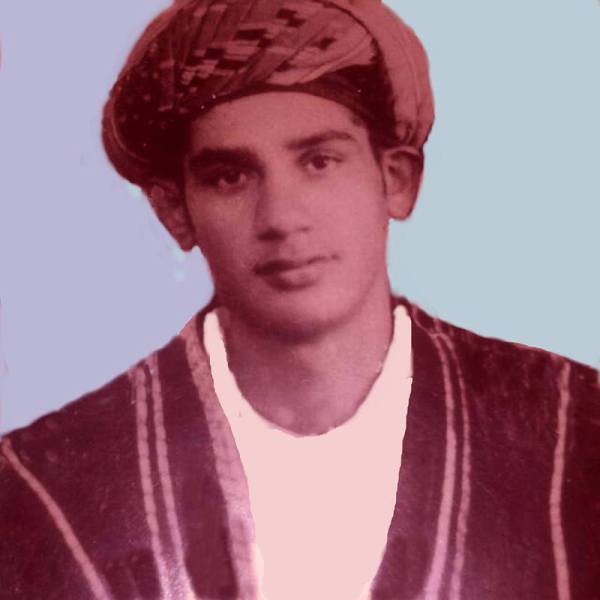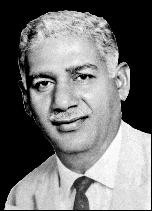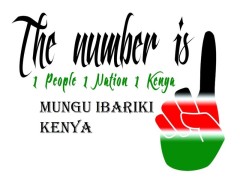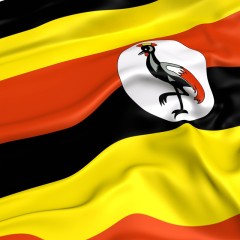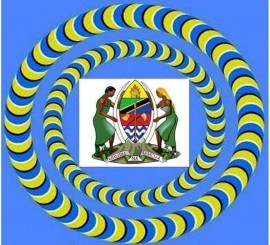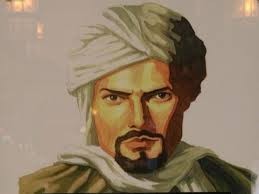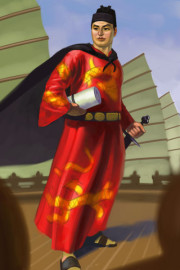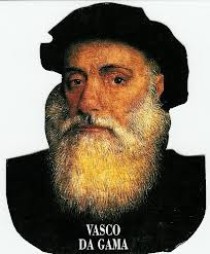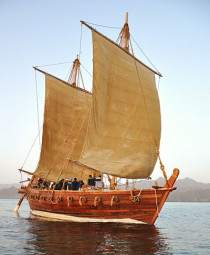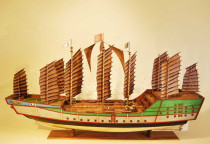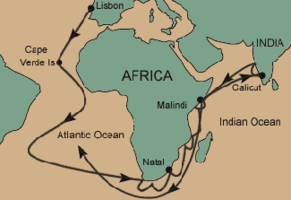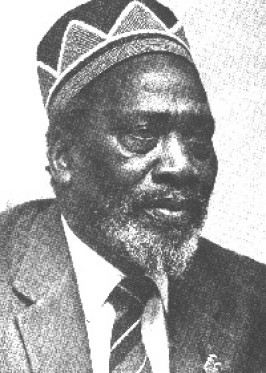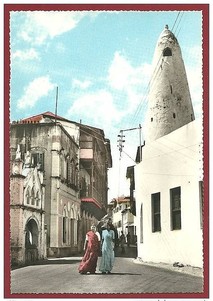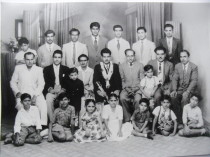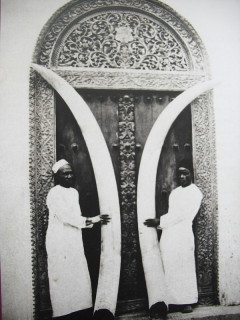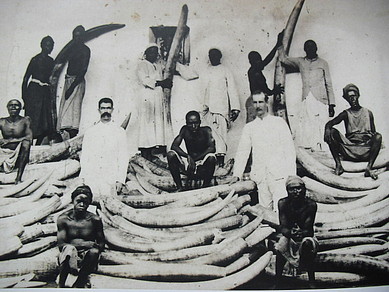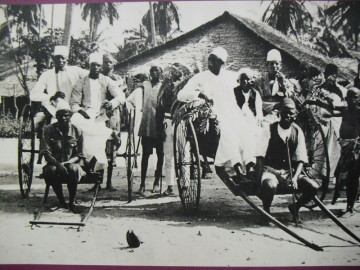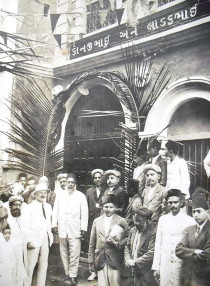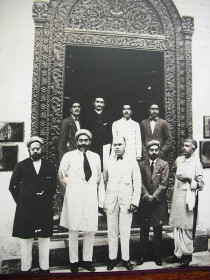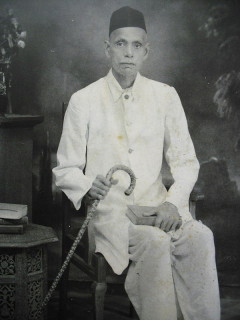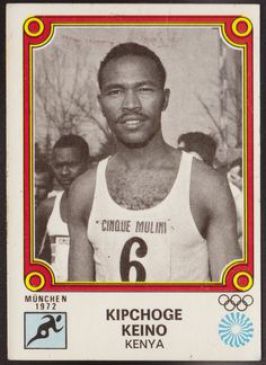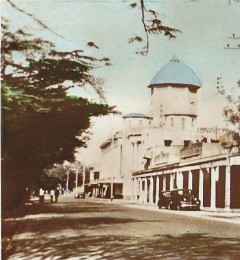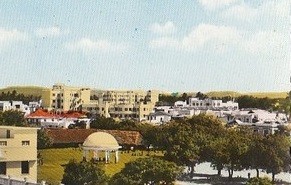The East African Baloch
http://www.chapatimystery.com/archives/homistan/the_east_african_baloch.html
Replug: The Baluch of East Africa
THE BALOCHI
Photo shows Abdalla with his Karamojong gun-bearer. These marauding lions were shot in Uganda in the 1940's.
Abdalla Shahkaram lived most of his life in Uganda at Arua. He was a professional hunter and later an honorary game warden. In 1948 he shot a rogue elephant at Changamwe, Mombasa. His best friend was Sheikh Mbarak Ali Hinawy the Liwali of the Kenya Coast. Abdulla Shahkaram was a great hunter/naturalist who died in the late 1950's in Uganda.
He was also an honorary Game Warden in Uganda. Most Professional hunter of last century turned Game Wardens and Wild Life conservationist after hunting was controlled or abolished altogether.
The case in point is yourself and George Adamson. It was in those days almost exclusively for the 'Wazungu', but a few of us did get in!
Was Merwin Cowie ever involved in hunting? He established the Nairobi National park and when he proposed its creation the Colonial Administrators were surprised and had some misgivings about the idea. He finally got the approval and what we now enjoy is his legacy.
Likewise Lynn Temple Boreham deserves credit and must be remembered by Kenyans for giving us the Masai Mara Game reserve which is now considered one of the wonders of the world.
The East African Baloch
Long time back, some indian fellow posted pics of Baloch's in Kenya.. it was a troll post... but after some time, i discovered that there were still Baloch &
Sindhi/cutchi communities in East Africa who had settled there a few centuries back.
These people were soldiers,officers who served in Iranian and Arab forces and had fought the Portugese empire in its prime.
https://defence.pk/pdf/threads/the-east-african-baloch.488110/
CLICK ON PHOTO
OBITUARY March 1953
With the passing of Abdul Hamid Khan at the age of 70, yet another link with the original Uganda Railway has been severed.
Recruited from India in 1900 for the early construction work, he took up an appointment with the Engineering Department of the Railway as a ganger in 1904 and worked his way up to the rank of Permanent Way Inspector, a post which he held until he finally retired in 1950 with a break of only three years.
He was a Permanent Way Inspector of outstanding merit and possessed the unique faculty of being able to train his maintenance gangs by dint of example and patient handling. Of fine character and kindly disposition he commanded the respect of all the staff with whom he came in contact.
Throughout his many years on the line and in the “field” his prowess as a hunter could scarcely be rivalled. His feat amongst many others of destroying a large pride of lion which attacked him, and his ultimate shot which killed the remaining two of the pride with one bullet, earned him the name of “Simba Mbili”, by which name he was known throughout the Railway system and by many members of the public.
It was at Mtito Andei, his official station for so many years, that “Simba Mbili” elected to retire, and with the railway track on one side of his home and the wide open spaces on the other, one may hope that his remaining years of well-earned rest were happily spent.
Here is the father of all professional hunters in Kenya. Abdul Hamid Khan known as Simba Mbili killed two lions with a single bullet? No any other record available even in the Guinness book of records?
Another brave railway man in the annals of Kenyan history was popularly known as Simba Mbili. Abdul Hamid Khan stood six- and-a-half foot tall with wrists the size of an ordinary man’s calf. He arrived in IBEA around 1890 and worked for the railway as a Senior Permanent Way Inspector, or ‘SPWI’, in railway jargon. Khan combined his official duties with hunting. He was often called upon to kill lions - sadly considered vermin in those pioneer days - that were attracted to stations where the shade and dripping water from the overhead water tanks provided a salubrious environment.
One day while riding his inspection trolley with his entourage of African pushers in the vicinity of Tsavo River, he came across a
pride of lions crossing the tracks ahead. Ikram Hassam of Mombasa, who knew him well, takes up the story: "They stopped and went on a nearby ridge, and from there they saw a whole pride pulling down a giraffe. Abdul Hamid had his .303
rifle with him and twelve bullets. He picked off the lions one by one, killing ten of them. The eleventh bullet killed two lions, for it went right through one, and got the one behind in the neck.
Someone watching from the top of the hill shouted ‘simba mbili, simba mbili!’
Abdul thought he had killed all the lions, and was drinking from his water bottle, when
one lioness that had only been stunned got up and charged at him. She was so dose that he shoved the barrel of the rifle right into her mouth andJired, killing her at the very last minute with his
very last bullet".
" ...One day when he was going for guinea fowl he started up a buffalo. The buffalo
charged at him and gored him repeatedly. He stayed nine months in hospital and never hunted again until I started hunting in the 1940s.
“He took me under his wing because he knew my father very well...The Government had given him a plot at Mtito Andei where he put up the small
SIMBA MB1LI HOTEL. I, and my family would stay with him there. He had two wives but no children,
and he died in Nairobi in the 1950s”. Satya V Sood
------------------------------------------------------------------------------------------
The Life and Death of the Fabulous BALI.
http://balimauladad.com/2008/09/27/the-life-and-death-of-the-fabulous-bali/#more-222
Balochi Oral Tradition.
04 Jun By:Sabir Badalkhan
What is Oral Tradition?
The oral tradition of the Baloch belongs to an ethnic group speaking a northwest Iranian language called Balochi and inhabiting Balochistan, a country now divided among Pakistan, Iran, and Afghanistan. It was until recently—and to a great extent in many parts of the country it remains even now—a living art. It is, however, an art that is losing ground rapidly to the written word and to modern means of communication and entertainment.
A few decades back oral tradition was present in a Baloch’s life from cradle to grave. It was so diffused, authoritative, and highly esteemed that among some Baloch tribes a newborn baby boy was presented with the recital of several heroic epics—either three or seven—by an old man in place of the call of prayers, azan (the proclamation of faith among Muslims saying that Allah is the only God and Muhammad is his only prophet), as is usually done in many other Muslim communities.
A special session of epic recitation would be arranged and male elders of the family would be invited, animal(s) would be sacrificed, and a male elder of the family or someone else from the family or tribe would recite these epics for three to seven nights (Badalkhan 1992:38, n. 39). This was the first lesson the newborn boy would receive from the elders of his family, who expected him to behave accordingly and to follow in the footsteps of past Baloch heroes who left their legacy in historical epics with heroic deeds that safeguarded true Baloch values (balochiat).
Cont: http://balochilinguist.wordpress.com/2011/06/04/balochi-oral-tradition/
More On the Balochi: http://en.wikipedia.org/wiki/History_of_Balochistan
The culture of East African Baluchis
By:
Abdul kadir Noor Mohamed,
Kenya, East Africa
The culture of East African Baluchis has undergone quite a metamorphosis from the 1700s to the present day. With time traditional Baluchi lifestyle gradually eroded and a more Swahili one took its place. Our ancestors interacted with the local people and assimilated to become part and parcel of the social life of the region. As the Baluchi language gave way to Kiswahili, the lingua franca of East Africa, so too did a lot of our traditional cultural norms. It must be noted however, that at no time did we ever lose our identity.
Language apart, the Baluchis here have always maintained a separate identity from the rest of the people. The use of Baluchi names and the continuous narration of our culture and Iranian history has kept the awareness of our roots still fresh in our minds, and our yearning for self- preservation still very much alive. Some families have successfully resisted the change of language and still proudly speak good Baluchi, albeit diluted in grammar and vocabulary, but fluent. We have also managed to maintain strong social cohesion amongst ourselves. For a very long time, families strictly married only from each other, perhaps in an effort to preserve the tribe. Although this provision is no longer strictly followed, it is still highly preferred.
Cont: http://balochilinguist.wordpress.com/2011/06/08/the-culture-of-east-african-baluchis/
The Baluchi of East Africa: Dynamics of Assimilation and Integration
http://www.tandfonline.com/doi/abs/10.1080/21520844.2013.831726#.Us2SfxRFBMt
Introduction
Balochistan is the largest of the four provinces of Pakistan and possesses a rich variety of languages, resources, civilization and culture. The province is located at the geographical intersection and cultural crossroads of South Asia, Central Asia, and the Middle East. As a result, it is one of the richest areas in the country in terms of antiquities, archaeological sites, and historical archives.
http://www.balochistanarchives.gob.pk/home
https://www.facebook.com/balochistanarchives
https://www.facebook.com/BeautyOfInteriorBalochistan
Only if people would read into the history of the Baluchi people, the only people that I know of who make the so called Multiculturalism of this era look so
historical. Their history is so rich, in fact it seems little is known of these prevalent traditional historical people, spanning across the Middle East and beyond, right up to Pakistan, yet who are
a people without a land.
The Baluchi people are mentioned in many historical books and are mostly diverse people and can be found in many different numerous walks of lives, yet silently make themselves known, below is an
exemplification into “The Baluch of East Africa”
The Baluch of East Africa
Posted on 8 by A. I. Noormohamed
Baluch
settlements on Makadara Road, Mombasa, 1920
They journeyed in the fabled dhows; white crescent sails blown by ocean winds, three hundred years ago, as soldiers of fortune, to the east coast of Africa; to build an empire for the Sultan Of Oman who had conquered their homeland on south coastal fringes of the Persian empire, and to whom they now owed allegiance. It was a long fateful voyage undertaken by most for monetary gain, and thought to be a temporary mission, without quite realizing the impact that undertaking down the Indian Ocean would have on their future. And how lasting it would turn out to be.
https://noormohamed.net/2008/08/24/the-baluch-of-east-africa/
Remembering Late Khermohamed Ali (Heruu)
THROUGH HIS EFFORTS AND THOSE OF LATE
ABDULRAHMAN
MIRAN, A NEW MOSQUE WAS BUILT IN MOMBASA IN 1964 Mohamed Ismail One pioneer Baloch is not here, the late Abdulrahman Miran. In the 1920's he was in the Belgian
Congo setting up businesses. He was one of the early pioneers who worked to build the Kenya/Uganda railway. He is reputed to have walked all the way to the
Congo).
Coastweek-- The Funeral cortege which started from the Baluchi Mosque was already lined with people of all faiths, ethnicity and colour.


